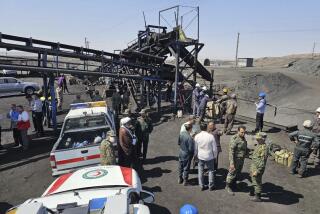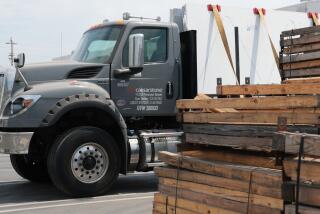Mine explosion indictment brings some solace to workers’ families
In the months before shift foreman Dean Jones died in a massive explosion at the Upper Big Branch coal mine in West Virginia in April 2010, Judy Petersen recalls, her brother complained to his family about persistent ventilation violations.
Petersen, a West Virginia physician, is one of dozens of family members of 29 miners killed in the disaster who have long demanded that the mine’s owners be held responsible.
This week, more than four years after the explosion at a mine cited for repeated safety violations, Donald L. Blankenship, the former chief executive of the company that operated the Upper Big Branch, was indicted on federal charges that he conspired to cover up deadly safety violations.
The indictment represented a watershed moment in West Virginia, where mining interests have dominated state politics and for years have beaten back attempts at tougher safety and environmental regulations. Mine owners have paid fines for safety violations but rarely have faced serious criminal charges.
Conspiracy and false-statement charges against Blankenship, the longtime chief executive at Massey Energy Co., have brought a measure of solace to families of the miners who died. But Petersen and other survivors also say safety violations continue to be tolerated by other mine owners in the pursuit of coal profits. Mine safety violations for West Virginia were unavailable Friday. But the federal Mine Safety and Health Administration has issued more than 7,000 notices nationwide this year for coal dust and ventilation violations at underground coal mines.
“We’re elated by this indictment,” Petersen said Friday. “We pray Don Blankenship goes to prison.”
A 43-page federal indictment, handed down Wednesday in Charleston, W.Va., accused Blankenship of conspiring to “commit and cause” hundreds of safety violations “in order to produce more coal, avoid the cost of following safety laws and make more money.” The four-count indictment charged Blankenship with concocting an elaborate warning system of coded messages to alert mine foremen of impending safety inspections.
After the disaster, the indictment says, Blankenship made false statements to the Securities and Exchange Commission and others about mine safety practices. He faces 31 years in prison if convicted on all charges.
“It’s an important day for many, many families in the central Appalachian coal fields,” said Bruce Stanley, a lawyer who has battled Blankenship in court for years on behalf of miners’ families. “For the first time in my memory, the CEO of a major coal producer is being held criminally accountable for the atrocious conduct that occurred on his watch.”
William Taylor, an attorney representing Blankenship, said in a statement: “Mr. Blankenship is entirely innocent of these charges. He will fight them and he will be acquitted.” Taylor called Blankenship “a tireless advocate for mine safety.”
Blankenship, who invoked his 5th Amendment rights and refused to answer questions from federal or state investigators, has defended his record at Massey. “If they put me behind bars ... it will be political,” he wrote in a 2013 blog post.
Blankenship, who retired several months after the explosion, has been a powerful political force in the state and a reliable Republican campaign contributor. He was reviled by environmentalists for his anti-regulation stand and accused by the families of some miners at Upper Big Branch of directly causing their deaths.
Blankenship’s indictment triggered searing statements by some miners and politicians in West Virginia, where the Upper Big Branch explosion, the worst U.S. coal mine disaster in 40 years, is still a volatile issue.
U.S. Sen. John D. Rockefeller IV (D-W.Va.) issued a sharply worded statement condemning Blankenship’s stewardship at Massey: “As he goes to trial, he will be treated far fairer and with more dignity than he ever treated the miners he employed. And, frankly, it’s more than he deserves.”
Cecil E. Roberts, president of United Mine Workers of America, said 52 miners died working at Massey mines while Blankenship led the company.
“For coal miners, working for Massey meant putting your life and your limbs at risk,” Roberts said in a statement.
Blankenship directed “a conspiracy to impede and hinder federal mine safety officials from carrying out their duties at Upper Big Branch ... so their underground operations could conceal and cover up safety violations that they routinely committed,” U.S. Atty. Booth Goodwin in Charleston said in a statement.
The indictment said Blankenship continued to actively undermine safety conditions at the mine even after receiving hundreds of reports and violation notices outlining serious safety shortcomings, including ventilation systems.
“Blankenship could have drastically reduced violations of mandatory federal safety standards ... by taking reasonable steps to follow the law,” the indictment said.
It also said that Blankenship pressured managers at Upper Big Branch to ignore safety regulations and instead focus on maximizing production. In a memo to one Upper Big Branch manager in 2008, Blankenship ordered him to “run some coal,” the indictment said. Blankenship added: “We’ll worry about ventilation or other issues at an appropriate time. Now is not the time.”
In March 2006, the indictment said, Blankenship sent a mine manager two handwritten notes accusing him of “insufficient attention to cost-cutting.”
“You have a kid to feed. Do your job,” one note said. When the manager failed to raise coal production to levels Blankenship demanded, the indictment said, he was warned in another note, “I could Khrushchev you. Do you understand?”
The 2010 explosion was caused by safety violations that prompted coal dust and methane to ignite, according to a 2011 report by the federal Mine Safety and Health Administration.
The investigation found “multiple examples of systematic, intentional and aggressive efforts by Massey to avoid compliance with safety and health standards, and to thwart detection of that noncompliance by federal and state regulators.” The report said Massey intimidated miners who sought to report safety violations by threatening to fire them.
Alpha Natural Resources, which bought Massey for $7.12 billion in 2011, said Thursday that Blankenship was never employed by Alpha. “We can only hope that the outcome of the upcoming proceedings will provide some level of comfort and closure for the families of the fallen miners,” the company said in a statement.
Stanley, the lawyer who has fought Massey and, like Blankenship, grew up in West Virginia coal country, said of his nemesis: “Don Blankenship has earned every year in prison he might get.”
Petersen, the dead mine foreman’s sister, said Jones once called a mine manager and demanded that his section be shut down because poor ventilation was endangering his men. He was ordered to continue working and threatened with dismissal if he continued to complain about safety violations, Petersen said.
Petersen said two nephews who work in other West Virginia coal mines were afraid to mention safety violations they had observed for fear of being fired.
“These mine companies are still practicing fear and intimidation,” Petersen said. “Until we change the coal mine culture in this state, these dangerous conditions will never improve.”
More to Read
Sign up for Essential California
The most important California stories and recommendations in your inbox every morning.
You may occasionally receive promotional content from the Los Angeles Times.











